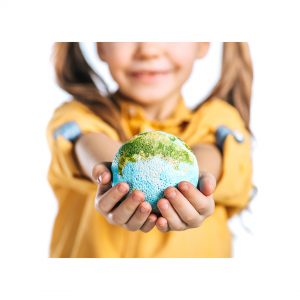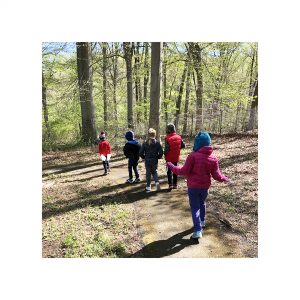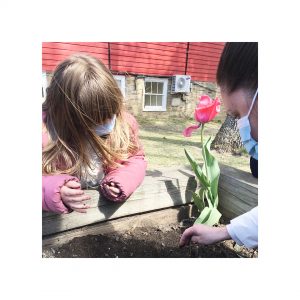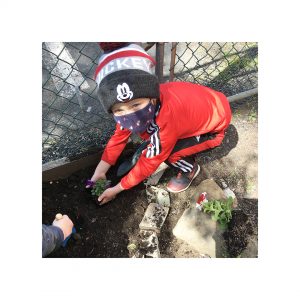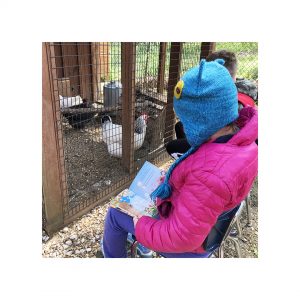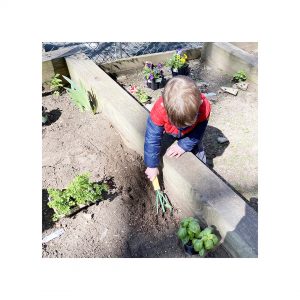Every April, the students of Trevose Day School come together to celebrate Earth Day. This day is filled with so many wonderful activities and lessons that help our children know the importance of helping our planet not just one day, but every day.
Our philosophy focuses on teaching our children who feel small, that they can actually make BIG changes in their daily lives. Any step in the right direction, is a good direction. We teach children to appreciate and respect the ways in which they are connected to and depend on nature. As the children walked the path in the nearby woods on Thursday, we pointed out the many habitats of forest creatures. We carefully stepped around spider webs, and also learned to leave the moss on the trees so that it remains a home for insects and other small creatures. The teachers brought a trash bag with them to collect the litter that is impacting these habitats too. We really walked the walk and talked the talk this Earth Day.
We also taught the children that they can plant their own food with vegetable plants and seeds. In addition, we planted many beautiful flowers to supply food and shelter to numerous insects. The children learned all about healthy soil and water, and how we depend on the sun’s energy. We talked about garden helpers, like butterflies, bees, ladybugs and spiders, who protect and pollinate our plants in exchange for their own food and shelter. They also spent time collecting eggs and feeding our chickens. It is a wonderful lesson for children to see where their food actually comes from before it is on the shelf of their local grocery store.
Throughout the days and years, we teachers nurture children’s instincts to be protectors and help them see their own power to affect their environment. Through all of these nature lessons, children learn how to take care of the environment, but in small, tangible ways that relate to their every-day life.
We can all be facilitators of learning about how to care for our planet. At home parents can read to their children about things they know and love. A good way to begin is to collect colorful picture books about aspects of the natural world — topics such as plants, water, birds, dolphins, fish, whales, weather, seasons, and space. Garden with your children or plant some trees. Research and create some habitats for insects that are beneficial to your garden and yard. Use reusable containers and water bottles. Children are so keenly tuned in to your behaviors that it’s easy to become their role model for recycling everything usable and doing small things everyday to make a difference.
Lastly, we as teachers and parents are the best examples for our children. Here’s a few quick changes you can make at home to be more sustainable:
10 Sustainable Lifestyle Tips for Families
- Conserve energy. Teach your children to turn off lights and electronics when not in use. Make it a habit to use natural light in your home as often as possible. You can also conserve energy by wearing extra clothing layers before you turn the heat on.
- Purchase a travel mug and a travel water bottle. Invest in reusable drink containers instead of buying plastic water bottles that will end up in landfills. When you purchase coffee, use your own refillable mug. Some coffee shops, such as Starbucks, even offer a discount for doing so!
- Reduce your carbon footprint. Vehicle emissions cause major damage to the environment. Therefore, look for opportunities to walk or bike when possible. When you do need a vehicle, carpool.
- Grow your own food. Creating a family garden will be well worth it. Not only will you have fun, but your children will also learn the value of growing their own food. When shopping for groceries, buy local food to support your local farming community and avoid shipping.
- Eliminate unnecessary mail. According to EarthTalk, “The average American receiving 16 pieces each week. While this might not seem like much, it adds up to weigh an estimated 41 pounds each year.” Instead of accumulating 41 pounds of waste for no reason, eliminate junk mail and opt for electronic billing.
- Upgrade your lights. If you have not already upgraded your home with LED lights, the time is now. LED lights use less energy, which means they demand less from power plants. Hence, they are better for the environment.
- Conserve water. Talk to your children about the importance of conserving water and make it part of your family’s lifestyle. For instance, teach them not to waste water by turning the water off while they brush their teeth or by taking shorter showers. Turn it into a family competition to see who can take the fastest shower.
- Avoid disposable, single-use items. When you shop, avoid making the easy, convenient choice at the moment, which will have longer-lasting impacts on the environment. For instance, avoid plastic bags and take your own reusable bags. Stores like Whole Foods encourage consumers by not providing plastic bags. Additionally, avoid purchasing items that are designed for single-use only, such as fruit snacks and juice boxes. Instead, buy in bulk and use your own reusable containers.
- Shop for clothes responsibly. As a family, choose to purchase durable clothing from sustainable sources. For example, Patagonia has a “buy back” policy known as the Worn Wear Program. Or, choose to shop second-hand at thrift stores.
- Recycle as a family. Make recycling a family habit. Set up a family recycling station in your home and teach your children how to identify recycling symbols. Starting to compost will help your kids learn about plants and biology as a plus!
For more sustainable living suggestions, check out:
- 5 Ways To Teach Your Kids About The Importance Of Being Eco-Friendly On Earth Day
- 5 Ways To Live Green This Year
- Top 10 Ways To Reduce Waste (And Go Green)
